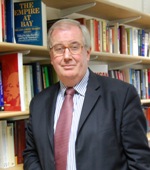Bertrand Badie (born 1950) is a French political scientist and international relations specialist, emeritus professor at Sciences Po. [1] He is one of the most renowned French specialists in international relations. [2]

Bertrand Badie (born 1950) is a French political scientist and international relations specialist, emeritus professor at Sciences Po. [1] He is one of the most renowned French specialists in international relations. [2]

Politics is the set of activities that are associated with making decisions in groups, or other forms of power relations among individuals, such as the distribution of resources or status. The branch of social science that studies politics and government is referred to as political science.
Political science is the scientific study of politics. It is a social science dealing with systems of governance and power, and the analysis of political activities, political thought, political behavior, and associated constitutions and laws.
A coalition is formed when two or more people or groups temporarily work together to achieve a common goal. The term is most frequently used to denote a formation of power in political or economic spaces.

Titoism is a socialist political philosophy most closely associated with Josip Broz Tito during the Cold War. It is characterized by a broad Yugoslav identity, socialist workers' self-management, a political separation from the Soviet Union, and leadership in the Non-Aligned Movement.

Zveno, Politicheski krŭg "Zveno", officially Political Circle "Zveno" was a Bulgarian political organization, founded in 1930 by Bulgarian politicians, intellectuals and Bulgarian Army officers. It was associated with a newspaper of that name.
The national interest is a sovereign state's goals and ambitions, taken to be the aim of government.
Alexander Wendt is an American political scientist who is one of the core social constructivist researchers in the field of international relations, and a key contributor to quantum social science. Wendt and academics such as Nicholas Onuf, Peter J. Katzenstein, Emanuel Adler, Michael Barnett, Kathryn Sikkink, John Ruggie, Martha Finnemore, and others have, within a relatively short period, established constructivism as one of the major schools of thought in the field.
Sovereigntism, sovereignism or souverainism is the notion of having control over one's conditions of existence, whether at the level of the self, social group, region, nation or globe. Typically used for describing the acquiring or preserving political independence of a nation or a region, a sovereigntist aims to "take back control" from perceived powerful forces, either against internal subversive minority groups, or from external global governance institutions, federalism and supranational unions. It generally leans instead toward isolationism, and can be associated with certain independence movements, but has also been used to justify violating the independence of other nations.
Corporate statism, state corporatism, or simply corporatism is a political culture and a form of corporatism the proponents of which claim or believe that corporate groups should form the basis of society and the state. By this principle, the state requires all citizens to belong to one of several officially designated interest groups, which consequently have great control of their members. Such interest groups thus attain public status, and they or their representatives participate with national policymaking, at least formally.

Gilford John Ikenberry is a theorist of international relations and United States foreign policy, and the Albert G. Milbank Professor of Politics and International Affairs at Princeton University. He is known for his work on liberal International Relations theory, such as the books After Victory (2001) and Liberal Leviathan (2011). He has been described as "the world's leading scholar of the liberal international order."
Helen V. Milner is an American political scientist and the B. C. Forbes Professor of Public Affairs at the Woodrow Wilson School of Public and International Affairs at Princeton University, where she is also the Director of the Niehaus Center for Globalization and Governance. She has written extensively on issues related to international political economy like international trade, the connections between domestic politics and foreign policy, globalization and regionalism, and the relationship between democracy and trade policy.

Michael E. Cox is a British academic and international relations scholar. He is currently Emeritus Professor of International Relations at the London School of Economics (LSE) and Director of LSE IDEAS. He also teaches for the TRIUM Global Executive MBA Program, an alliance of NYU Stern and the London School of Economics and HEC School of Management.

The Yugoslav Radical Union was the ruling far-right party of Yugoslavia from 1934 until the 1941 coup d'état.

Francis A. Beer is an American professor emeritus of political science, University of Colorado at Boulder. His research focuses on war and peace. Honors and awards include listings in Who's Who in the World and Who's Who in America, as well as other directories. He was president of the International Studies Association/West and co-edited, with Ted Gurr at the University of Colorado, a series of Sage books on "Violence, Conflict, Cooperation." In addition to two Fulbright awards to France and the Netherlands he has received other awards from the Earhart Foundation, the Institute for World Order, and the National Endowment for the Humanities. At the University of Colorado, he represented the faculty as chair of the Boulder Faculty Assembly.
Badie or Badié may refer to:

Christophe Jaffrelot is a French political scientist and Indologist specialising in South Asia, particularly India and Pakistan. He is a professor of South Asian politics and history the Centre d'études et de recherches internationales (CERI) at Sciences Po (Paris), a professor of Indian Politics and Sociology at the King's India Institute (London), and a Research Director at the Centre national de la recherche scientifique (CNRS).
Dirk Berg-Schlosser is professor emeritus of political science at University of Marburg in Germany.
Critical juncture theory focuses on critical junctures, i.e., large, rapid, discontinuous changes, and the long-term causal effect or historical legacy of these changes. Critical junctures are turning points that alter the course of evolution of some entity. Critical juncture theory seeks to explain both (1) the historical origin and maintenance of social order, and (2) the occurrence of social change through sudden, big leaps.
Salvador Santino Fulo Regilme Jr. is a Filipino-born Dutch International Relations scholar and political scientist focusing on international human rights norms, global governance, democratization, United States foreign policy, and foreign aid. He is a tenured International Relations academic based at the Institute of History within the Faculty of Humanities of Leiden University, the Netherlands.